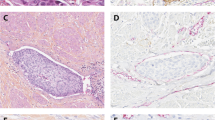Abstract
Introduction: The aim of our study was toevaluate tumor angiogenesis as a prognosticmarker of transitional cell carcinoma of thebladder and to asses its relationship toestablished variables for survival and responseto therapy.Patients and method: Microvessel density(MVD), a measure of tumor angiogenesis, wereevaluated in 77 primary bladder cancers.Forty-three superficial carcinomas and 34invasive carcinomas were analysed. Tumorspecimens of all patients were obtained bytransurethral resection (TUR) and all thetumors were transitional cell carcinomas.Twenty-two patients with invasive bladdercancer have undergone M-VEC chemotheraphy. Thecorrelation between MVD and histopathologicalgrade, tumor stage and prognosis was evaluated.MVD was identified by immunostaining ofendothelial cells using anti-CD34 antibody. Forstatistical analysis Kruskal-Vallis,Mann-Whitney U and Fisher’s exact tests were used.Results: MVD was correlated with tumorgrade, stage and prognosis. Significantlyhigher MVD was determined in invasive tumorsthan superficial tumors (p < 0.05). MVDincreased with tumor grade and stage(p < 0.05). High MVD was correlated with therisk of clinical progression in bothsuperficial and invasive bladder carcinomas(p < 0.05, p < 0.001 respectively). Invasivetumors with remission after M-VEC chemotheraphyhad lower MVD than tumors with progressionafter M-VEC.Conclusion: These data demonstrate thatMVD in bladder carcinoma correlates with grade,stage and malignant potential of the tumor.Quantification of tumor angiogenesis may allowselection of the type of treatment for bladdercancer patients.
Similar content being viewed by others

References
Rozanski TA, Grossman HB. Recent developments in the pathophysiology of bladder cancer. Am J Roentgenol 1994; 163: 789–792.
Fair WR, Fuks ZY, Scher HI. Cancer of the Bladder. Principles and Practice of Oncology, 4th edn. Philadelphia: Lippincott, 1993: 1052–1072.
Lutzeyer W, Rubben H, Dahm H. Prognostic parameters in superficial bladder cancer: an analysis of 315 patients. J Urol 1982; 127: 250–252.
Frazier HA, Robertson JE, Dodge RK, Paulson DF. The value of pathologic factors in predicting cancer-specific survival among patients treated with radical cystectomy for transitional cell carcinoma of the bladder and prostate. Cancer 1993; 71: 3993–4001.
Gasparini G, Harris AL. Clinical importance of the determination of tumor angiogenesis in breast carcinoma: much more than a new prognostic tool. J Clin Oncol 1995; 13: 765–782.
Macchiarini P, Fontanini G, Hardin MJ et al. Relation of neovascularisation to metastasis of non-small-cell lung cancer. Lancet 1992; 340: 145–146.
Pavlopoulos PM, Konstantinidou AE, Agapitos E et al. A morphometric study of neovascularization in colorectal carcinoma. Cancer 1998; 83: 2067–2075.
Weidner N. Intratumoral vascularity as a prognostic factor in cancers of the urogenital tract. Eur J Cancer 1996; 32A: 2506–2512.
Epstein JI, Amin MB, Reuter VR, Mostofi FK. The World Health Organisation/International Society of Urological Pathology consensus classification of urothelial (transitional cell) neoplasms of the urinary bladder. Am J Surg Pathol 1998; 22: 1435–1448.
Abel PD. Prognostic indices in transitional cell carcinoma of the bladder. Br J Urol 1988; 62: 103–109.
Eure GR, Cundiff MR, Schellhammer PF. Bacillus-calmette-Guerin therapy for high risk stage T1 superficial bladder cancer. J Urol 1992; 147: 376–379.
Herr HW, Laudone VP, Badalament RA et al. Bacillus-Calmette-Guerin therapy alters the progression of superficial bladder cancer. J Clin Oncol 1988; 6: 1450–1455.
Sternberg CN. Adjuvant and neo-adjuvant chemotherapy of invasive bladder cancer. EAU Update Series 1995; 4(4): 26–34.
Folkman J. What is the evidence that tumors are angiogenesis dependent? J Nat Cancer Inst 1990; 82: 4–6.
Dickinson AJ, Fox SB, Persad RA et al. Quantification of angiogenesis as an independent predictor of prognosis in invasive bladder carcinomas. Br J Urol 1994; 74: 762–766.
Jaeger TM, Weidner N, Chew K et al. Tumor angiogenesis correlates with lymph node metastasis in invasive bladder cancer. J Urol 1995; 154: 69–71.
Chaudhary R, Bromley M, Clarke NW et al. Prognostic relevance of microvessel density in cancer of the urinary bladder. Anticancer Res 1999; 19: 3479–3484.
Inoue K, Slaton JW, Karashima T et al. The prognostic value of angiogenesis factor expression for predicting recurrence and metastasis of bladder cancer after neoadjuvant chemotherapy and radical cystectomy. Clin Cancer Res 2000; 6: 4866–4873.
Bochner BH, Esrig D, Groshen S et al. relationship of tumor angiogenesis and nuclear p53 accumulation in invasive bladder cancer. Clin Cancer Res 1997; 3: 1615–1622.
Philp EA, Stephenson TJ, Reed MWR. Prognostic significance of angiogenesis in transitional cell carcinoma of the human urinary bladder. Br J Urol 1996; 77: 352–357.
Hawke CK, Delahunt B, Davidson PJT. Microvessel density as a prognostic marker for transitional cell carcinoma of the bladder. Br J Urol 1998; 81: 585–590.
Korkolopoulou P, Konstantinidou AE, Kavantzas N et al. Morphometric microvascular characteristics predict prognosis in superficial and invasive bladder cancer. Virc Arch 2001; 438: 603–611.
Dinney CPN, Babkowski RC, Antelo M et al. Relationship among cystectomy, microvessel density and prognosis in stage T1 transitional cell carcinoma of the bladder. J Urol 1998; 160: 1285–1290.
Author information
Authors and Affiliations
Corresponding author
Rights and permissions
About this article
Cite this article
Canoğlu, A., Göğüş, Ç., Bedük, Y. et al. Microvessel density as a prognostic marker in bladder carcinoma: Correlation with tumor grade, stage and prognosis. Int Urol Nephrol 36, 401–405 (2004). https://doi.org/10.1007/s11255-004-8869-9
Issue Date:
DOI: https://doi.org/10.1007/s11255-004-8869-9



